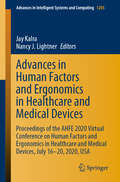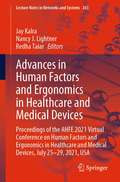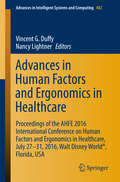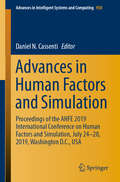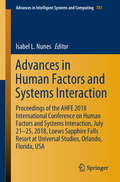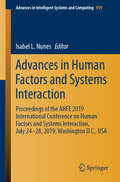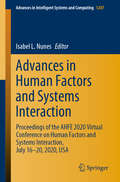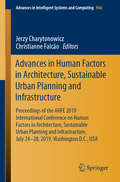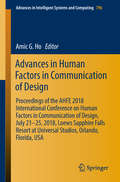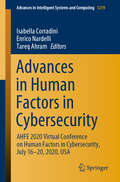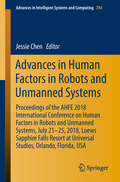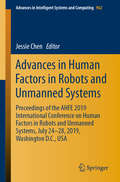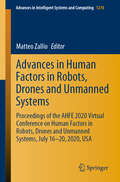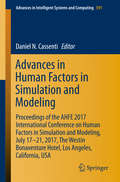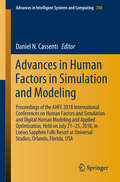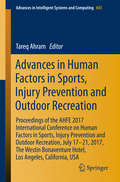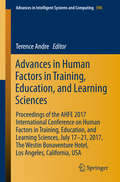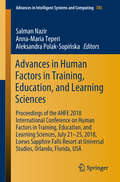- Table View
- List View
Advances in Human Factors and Ergonomics in Healthcare and Medical Devices: Proceedings of the AHFE 2020 Virtual Conference on Human Factors and Ergonomics in Healthcare and Medical Devices, July 16-20, 2020, USA (Advances in Intelligent Systems and Computing #1205)
by Nancy J. Lightner Jay KalraThis book explores how human factors and ergonomic principles are currently transforming healthcare. It reports on the design of systems and devices used to improve the quality, safety, efficiency and effectiveness of patient care, and discusses findings on improving organizational outcomes in the healthcare setting, as well as approaches to analyzing and modeling those work aspects that are unique to healthcare. Based on papers presented at the AHFE 2020 Virtual Conference on Human Factors and Ergonomics in Healthcare and Medical Devices, held on July 16–20, 2020, the book highlights the physical, cognitive and organizational aspects of human factors and ergonomic applications, and shares various perspectives, including those of clinicians, patients, health organizations and insurance providers. Given its scope, the book offers a timely reference guide for researchers involved in the design of medical systems and healthcare professionals managing healthcare settings, as well as healthcare counselors and international health organizations.
Advances in Human Factors and Ergonomics in Healthcare and Medical Devices: Proceedings of the AHFE 2021 Virtual Conference on Human Factors and Ergonomics in Healthcare and Medical Devices, July 25-29, 2021, USA (Lecture Notes in Networks and Systems #263)
by Nancy J. Lightner Redha Taiar Jay KalraThis book is concerned with human factors and ergonomics research and developments in the design and use of systems and devices for effective and safe healthcare delivery. It reports on approaches for improving healthcare devices so that they better fit to people’s, including special population’s needs. It also covers assistive devices aimed at reducing occupational risks of health professionals as well as innovative strategies for error reduction, and more effective training and education methods for healthcare workers and professionals. Equal emphasis is given to digital technologies and to physical, cognitive and organizational aspects, which are considered in an integrated manner, so as to facilitate a systemic approach for improving the quality and safety of healthcare service. The book also includes a special section dedicated to innovative strategies for assisting caregivers’, patients’, and people’s needs during pandemic. Based on papers presented at the AHFE 2021 Conference on Human Factors and Ergonomics in Healthcare and Medical Devices, held virtually on 25–29 July, 2021, from USA, the book offers a timely reference guide to both researchers and healthcare professionals involved in the design of medical systems and managing healthcare settings, as well as to healthcare counselors and global health organizations.
Advances in Human Factors and Ergonomics in Healthcare: Proceedings of the AHFE 2016 International Conference on Human Factors and Ergonomics in Healthcare, July 27-31, 2016, Walt Disney World®, Florida, USA (Advances in Intelligent Systems and Computing #482)
by Vincent G. Duffy Nancy LightnerAn examination of the various types of human-modeled technology, Advances in Applied Human Modeling and Simulation not only covers the type of models available, but how they can be applied to solve specific problems. These models provide a representation of some human aspects that can be inserted into simulations or virtual environments and facilitate prediction of safety, satisfaction, usability, performance, and sustainability. Topics include: Anthropometry and human functional dataBiomechanics, occupational safety, comfort and discomfort Biometric authentications Driving safety and human performance Enhancing human capabilities through aids or training Fuzzy systems and neural computing Human behavior and risk assessment modeling Integrating software with humans and systems International cooperation in education and engineering research Intelligent agents in decision training Intelligent data and text mining Machine learning and human factors Modeling physical aspects of work Monitoring systems and human decision Psychophysiological indicators of emotion Resilience engineering and human reliability Scenario-based performance in distributed enterprises Special populations Sustainability, earth sciences and engineering System-of-systems architecting and engineering Verification and validation Virtual interactive design and assessmentThe math and science provides a foundation for visualizations that can facilitate decision making by technical experts, management or those responsible for public policy. In considering a systems perspective and decisions that affect performance, these models provide opportunities for an expanded role of engineers and HF/E specialists to meet technical challenges worldwide. They can also be used to improve time-to-market, increase safety and ultimately the effectiveness of an organization. The book focuses on applications of these newly developed models and predictive capabilities useful to human factors and ergonomics engineers, cognitive engineers, human computer interaction engineers, human performance modeling engineers, and students in related fields.
Advances in Human Factors and Simulation: Proceedings Of The Ahfe 2017 Conference On Human Factors In Simulation And Modeling, July 17-21, 2017, Los Angeles, California, Usa (Advances in Intelligent Systems and Computing #591)
by Daniel N. CassentiThis book focuses on modeling and simulation research that advances the current state-of-the-art regarding human factors in this area. It reports on cutting-edge simulators such as virtual and augmented reality, on multisensory environments, and on modeling and simulation methods used in various applications, including surgery, military operations, occupational safety, sports training, education, transportation and robotics. Based on the AHFE 2019 International Conference on Human Factors in Simulation and Modeling, held on July 24-28, 2019, in Washington D.C., USA, the book serves as a timely reference guide for researchers and practitioners developing new modeling and simulation tools for analyzing or improving human performance. It also offers a unique resource for modelers seeking insights into human factors research and more feasible and reliable computational tools to foster advances in this exciting research field.
Advances in Human Factors and System Interactions: Proceedings of the AHFE 2021 Virtual Conference on Human Factors and Systems Interaction, July 25-29, 2021, USA (Lecture Notes in Networks and Systems #265)
by Isabel L. NunesThis book reports on innovative system interfaces, with a special emphasis on their design, development and testing, and on improving the interaction and integration with the users. Focusing on the advantages and challenges of virtual, augmented and mixed reality systems, it describes novel interface technologies, together with cutting-edge strategies for improving usability and accessibility, and cover a wide range of applications from business organization to disaster and crises management, from smart manufacturing to assistive technologies and transportation. Based on the AHFE 2021 Conference on Human Factors and Systems Interaction, held virtually on July 25–29, 2021, from USA, the book offers a timely survey on systems interfaces for a more efficient and safer human-system integration, addressing systems engineers, UX researchers and technology users alike.
Advances in Human Factors and Systems Interaction: Proceedings of the AHFE 2018 International Conference on Human Factors and Systems Interaction, July 21-25, 2018, Loews Sapphire Falls Resort at Universal Studios, Orlando, Florida, USA (Advances in Intelligent Systems and Computing #781)
by Isabel L. NunesThis book reports on cutting-edge research into innovative system interfaces, highlighting both lifecycle development and human–technology interaction, especially in virtual, augmented and mixed-reality systems. It describes advanced methodologies and tools for evaluating and improving interface usability and discusses new models, as well as case studies and good practices. The book addresses the human, hardware, and software factors in the process of developing interfaces for optimizing total system performance, particularly innovative computing technologies for teams dealing with dynamic environments, while minimizing total ownership costs. It also highlights the forces currently shaping the nature of computing and systems, including the need for decreasing hardware costs; the importance of portability, which translates to the modern tendency toward hardware miniaturization and technologies for reducing power requirements; the necessity of a better assimilation of computation in the environment; and social concerns regarding access to computers and systems for people with special needs. The book, which is based on the AHFE 2018 International Conference on Human Factors and Systems Interaction, held on July 21–25, 2018, in Orlando, Florida, USA, offers a timely survey and practice-oriented guide for systems interface users and developers alike.
Advances in Human Factors and Systems Interaction: Proceedings of the AHFE 2019 International Conference on Human Factors and Systems Interaction, July 24-28, 2019, Washington D.C., USA (Advances in Intelligent Systems and Computing #959)
by Isabel L. NunesThis book reports on cutting-edge research into innovative system interfaces, highlighting both lifecycle development and human–technology interaction, especially in virtual, augmented and mixed-reality systems. It describes advanced methodologies and tools for evaluating and improving interface usability and discusses new models, as well as case studies and good practices. The book addresses the human, hardware, and software factors in the process of developing interfaces for optimizing total system performance, while minimizing their costs. It also highlights the forces currently shaping the nature of computing and systems, such as: the importance of portability and technologies for reducing power requirements; the necessity of a better assimilation of computation in the environment; as well as solutions to promote accessibility to computers and systems for people with special needs. The book, which is based on the AHFE 2019 International Conference on Human Factors and Systems Interaction, held on July 24-28, 2019, in Washington D.C., USA, offers a timely survey and practice-oriented guide for systems interface users and developers alike.
Advances in Human Factors and Systems Interaction: Proceedings of the AHFE 2020 Virtual Conference on Human Factors and Systems Interaction, July 16-20, 2020, USA (Advances in Intelligent Systems and Computing #1207)
by Isabel L. NunesThis book presents cutting-edge research on innovative system interfaces, highlighting both lifecycle development and human–technology interaction, especially in virtual, augmented and mixed reality systems. It describes advanced methodologies and tools for evaluating and improving interface usability, and discusses new models, case studies and good practices. The book addresses the human, hardware, and software factors in the process of developing interfaces for optimizing total system performance, while minimizing costs. It also highlights the forces currently shaping the nature of computing and systems, such as the importance of portability and technologies for reducing power requirements; the need for better assimilation of computation in the environment; and solutions to promote computer and system accessibility for people with special needs. Based on the AHFE 2020 Virtual Conference on Human Factors and Systems Interaction, held on July 16–20, 2020, the book offers a timely survey and a practice-oriented guide for systems interface users and developers alike.
Advances in Human Factors in Architecture, Sustainable Urban Planning and Infrastructure: Proceedings of the AHFE 2019 International Conference on Human Factors in Architecture, Sustainable Urban Planning and Infrastructure, July 24-28, 2019, Washington D.C., USA (Advances in Intelligent Systems and Computing #966)
by Jerzy Charytonowicz Christianne FalcãoThis book discusses human factors research directed towards realizing and assessing sustainability in the built environment and architecture. It reports on advanced engineering methods for sustainable infrastructure design, architecture as well as on assessments of the efficient methods and the social, environmental, and economic impact of various designs and projects. The book covers a range of topics, including the use of recycled materials in architecture, ergonomics in buildings and public design, sustainable design for smart cities, design for the aging population, industrial design, human scale in architecture, and many more. Based on the AHFE 2019 International Conference on Human Factors in Architecture, Sustainable Urban Planning and Infrastructure, held on July 24-28, 2019, in Washington D.C., USA, it offers various perspectives on sustainability and ergonomics. As such, it is a valuable reference resource for designers, urban engineers, architects, infrastructure professionals, public infrastructure owners, policy makers, government engineers and planners, as well as operations managers and academics active in urban and infrastructure research.
Advances in Human Factors in Communication of Design: Proceedings of the AHFE 2018 International Conference on Human Factors in Communication of Design, July 21-25, 2018, Loews Sapphire Falls Resort at Universal Studios, Orlando, Florida, USA (Advances in Intelligent Systems and Computing #796)
by Amic G. HoThis book focuses on the emerging role of human factors in understanding, communicating with and engaging users. It reports on innovative approaches, highlighting visuals cues, such as new typographies, geometries and graphics for mobile and computer interfaces. The book also covers image and video processing, user-focused data compression, generative visuals, computational photography, and interactive design. Further topics include creative and empathetic design, human touch in digital graphics and experiential graphics. Based on the AHFE 2018 International Conference on Human Factors in Communication of Design, held on July 21–25, 2018, in Orlando, Florida, USA, this book reports on new findings, best-practices and case studies, providing readers with a fresh perspective and novel insights into the applications of human factors for enhancing the communication of design to users.
Advances in Human Factors in Communication of Design: Proceedings of the AHFE 2019 International Conference on Human Factors in Communication of Design, July 24-28, 2019, Washington D.C., USA (Advances in Intelligent Systems and Computing #974)
by Amic G. HoThis book focuses on the emerging role of human factors in understanding, communicating with and engaging users. It reports on innovative approaches, highlighting visuals cues, such as new typographies, geometries and graphics for mobile and computer interfaces. The book also covers image and video processing, user-focused data compression, generative visuals, computational photography, and interactive design. Further topics include creative and empathetic design, human touch in digital graphics and experiential graphics. Based on the AHFE 2019 International Conference on Human Factors in Communication of Design, held on July 24-28, 2019, in Washington D.C., USA, this book reports on new findings, best-practices and case studies, providing readers with a fresh perspective and novel insights into the applications of human factors for enhancing the communication of design to users.
Advances in Human Factors in Cybersecurity: AHFE 2020 Virtual Conference on Human Factors in Cybersecurity, July 16–20, 2020, USA (Advances in Intelligent Systems and Computing #1219)
by Tareq Ahram Isabella Corradini Enrico NardelliThis book reports on the latest research and developments in the field of human factors in cybersecurity. It analyzes how the human vulnerabilities can be exploited by cybercriminals and proposes methods and tools to increase cybersecurity awareness. The chapters cover the social, economic and behavioral aspects of the cyberspace, providing a comprehensive perspective to manage cybersecurity risks. By gathering the proceedings of the AHFE Virtual Conference on Human Factors Cybersecurity, held on July 16–20, 2020, this book offers a timely perspective of key psychological and organizational factors influencing cybersecurity, reporting on technical tools, training methods and personnel management strategies that should enable achieving a holistic cyber protection for both individuals and organizations. By combining concepts and methods of engineering, education, computer science and psychology, it offers an inspiring guide for researchers and professionals, as well as decision-makers, working at the interfaces of those fields.
Advances in Human Factors in Cybersecurity: Proceedings of the AHFE 2017 International Conference on Human Factors in Cybersecurity, July 17−21, 2017, The Westin Bonaventure Hotel, Los Angeles, California, USA (Advances in Intelligent Systems and Computing #593)
by Denise NicholsonThis book reports on the latest research and developments in the field of cybersecurity, placing special emphasis on personal security and new methods for reducing human error and increasing cyber awareness, as well as innovative solutions for increasing the security of advanced Information Technology (IT) infrastructures. It covers a broad range of topics, including methods for human training; novel Cyber-Physical and Process-Control Systems; social, economic, and behavioral aspects of cyberspace; issues concerning the cybersecurity index; security metrics for enterprises; risk evaluation, and many others. Based on the AHFE 2017 International Conference on Human Factors in Cybersecurity, held on July 17-21, 2017, in Los Angeles, California, USA, the book not only presents innovative cybersecurity technologies, but also discusses emerging threats, current gaps in the available systems, and future challenges that may be successfully overcome with the help of human factors research.
Advances in Human Factors in Cybersecurity: Proceedings of the AHFE 2019 International Conference on Human Factors in Cybersecurity, July 24-28, 2019, Washington D.C., USA (Advances in Intelligent Systems and Computing #960)
by Waldemar Karwowski Tareq AhramThis book reports on the latest research and developments in the field of cybersecurity, particularly focusing on personal security and new methods for reducing human error and increasing cyber awareness, as well as innovative solutions for increasing the security of advanced Information Technology (IT) infrastructures. It covers a broad range of topics, including methods for human training; novel cyber-physical and process-control systems; social, economic, and behavioral aspects of cyberspace; issues concerning the cybersecurity index; security metrics for enterprises; and risk evaluation. Based on the AHFE 2019 International Conference on Human Factors in Cybersecurity, held on July 24-28, 2019, in Washington D.C., USA, the book not only presents innovative cybersecurity technologies, but also discusses emerging threats, current gaps in the available systems, and future challenges that may be successfully overcome with the help of human factors research.
Advances in Human Factors in Energy: Proceedings of the AHFE 2016 International Conference on Human Factors in Energy: Oil, Gas, Nuclear and Electric Power Industries, July 27-31, 2016, Walt Disney World®, Florida, USA (Advances in Intelligent Systems and Computing #495)
by Sacit M. Cetiner Paul Fechtelkotter Michael LegattThis book addresses human factors research in energy, an emphasis on human factors applications in design, construction, and operation of nuclear, electrical power generation, and oil and gas assets. It discusses advanced strategies in the optimization of human and environmental performance, as well as personal and process safety. The book covers a wealth of topics in design and operation management of both offshore and onshore facilities, including design of control rooms, front-end engineering design (FEED), criticality analysis, offshore transport, human contributions to accidents, cognitive bias in decision making, safety-critical human tasks, and many others. Based on the AHFE 2016 International Conference on Human Factors in Energy, held on July 27-31, 2016, in Walt Disney World#65533;, Florida, USA, the book fills an important gap in the current literature, providing readers with state-of-the-art knowledge in human factors best-practice approaches across different types of industries and energy applications.
Advances in Human Factors in Energy: Proceedings of the AHFE 2017 International Conference on Human Factors in Energy: Oil, Gas, Nuclear and Electric Power Industries, July 17–21, 2017, The Westin Bonaventure Hotel, Los Angeles, California, USA (Advances in Intelligent Systems and Computing #599)
by Paul Fechtelkotter Michael LegattThis book addresses human factors research in energy, an emphasis on human factors applications in design, construction, and operation of nuclear, electrical power generation, and oil and gas assets. It discusses advanced strategies in the optimization of human and environmental performance, as well as personal and process safety. The book covers a wealth of topics in design and operation management of both offshore and onshore facilities, including design of control rooms, front-end engineering design (FEED), criticality analysis, offshore transport, human contributions to accidents, cognitive bias in decision making, safety-critical human tasks, and many others. Based on the AHFE 2016 International Conference on Human Factors in Energy, held on July 27-31, 2016, in Walt Disney World#65533;, Florida, USA, the book fills an important gap in the current literature, providing readers with state-of-the-art knowledge in human factors best-practice approaches across different types of industries and energy applications.
Advances in Human Factors in Robots and Unmanned Systems: Proceedings of the AHFE 2018 International Conference on Human Factors in Robots and Unmanned Systems, July 21-25, 2018, Loews Sapphire Falls Resort at Universal Studios, Orlando, Florida, USA (Advances in Intelligent Systems and Computing #784)
by Jessie ChenThis book focuses on the importance of human factors in the development of safe and reliable unmanned systems. It discusses current challenges such as how to improve the perceptual and cognitive abilities of robots, develop suitable synthetic vision systems, cope with degraded reliability in unmanned systems, predict robotic behavior in case of a loss of communication, the vision for future soldier–robot teams, human–agent teaming, real-world implications for human–robot interaction, and approaches to standardize both the display and control of technologies across unmanned systems. Based on the AHFE 2018 International Conference on Human Factors in Robots and Unmanned Systems, held on July 21–25, 2018, in Orlando, Florida, USA, this book fosters new discussions and stimulates new advances in the development of more reliable, safer, and highly functional devices for carrying out automated and concurrent tasks.
Advances in Human Factors in Robots and Unmanned Systems: Proceedings of the AHFE 2019 International Conference on Human Factors in Robots and Unmanned Systems, July 24-28, 2019, Washington D.C., USA (Advances in Intelligent Systems and Computing #962)
by Jessie ChenThis book focuses on the importance of human factors in the development of safe and reliable unmanned systems. It discusses current challenges such as how to improve the perceptual and cognitive abilities of robots, develop suitable synthetic vision systems, cope with degraded reliability in unmanned systems, predict robotic behavior in case of a loss of communication, the vision for future soldier–robot teams, human–agent teaming, real-world implications for human–robot interaction, and approaches to standardize both the display and control of technologies across unmanned systems. Based on the AHFE 2019 International Conference on Human Factors in Robots and Unmanned Systems, held on July 24–28, 2019, Washington D.C., USA, this book fosters new discussions and stimulates new advances in the development of more reliable, safer, and highly functional devices for carrying out automated and concurrent tasks.
Advances in Human Factors in Robots, Drones and Unmanned Systems: Proceedings of the AHFE 2020 Virtual Conference on Human Factors in Robots, Drones and Unmanned Systems, July 16-20, 2020, USA (Advances in Intelligent Systems and Computing #1210)
by Matteo ZallioThis book focuses on the importance of human factors in the development of safe and reliable robotic and unmanned systems. It discusses current challenges, such as how to improve the perceptual and cognitive abilities of robots, develop suitable synthetic vision systems, cope with degraded reliability in unmanned systems, and predict robotic behavior in relation to human activities. Further, it highlights potential future human-robot and human-agent collaboration, suggesting real-world implications of and approaches for improving human-machine interaction across unmanned systems. Based on the AHFE 2020 Virtual Conference on Human Factors in Robots, Drones and Unmanned Systems, held on July 16–20, 2020, this book is intended to foster discussion and collaborations among researchers and practitioners, thus stimulating new solutions for the development of reliable and safe, human-centered, highly functional devices to perform automated and concurrent tasks.
Advances in Human Factors in Robots, Unmanned Systems and Cybersecurity: Proceedings of the AHFE 2021 Virtual Conferences on Human Factors in Robots, Drones and Unmanned Systems, and Human Factors in Cybersecurity, July 25-29, 2021, USA (Lecture Notes in Networks and Systems #268)
by Matteo Zallio Carlos Raymundo Ibañez Jesus Hechavarria HernandezThis book focuses on the importance of human factors in the development of safe and reliable robotic and unmanned systems. It discusses solutions for improving the perceptual and cognitive abilities of robots, developing suitable synthetic vision systems, coping with degraded reliability in unmanned systems, and predicting robotic behavior in relation to human activities. It covers the design of improved, easy to use, human–system interfaces, together with strategies for increasing human–system performance, and reducing cognitive workload at the user interface. It also discusses real-world applications and case studies of human-robot and human-agent collaboration in different business and educational endeavors. The second part of the book reports on research and developments in the field of human factors in cybersecurity.Contributions cover the technological, social, economic and behavioral aspects of the cyberspace, providing a comprehensive perspective to manage cybersecurity risks. Based on the two AHFE 2021 Conferences such as the AHFE 2021 Conference on Human Factors in Robots, Drones and Unmanned Systems, and the AHFE 2021 Conference on Human Factors in Cybersecurity, held virtually on 25–29 July, 2021, from USA, this book offers extensive information and highlights the importance of multidisciplinary approaches merging engineering, computer science, business and psychological knowledge. It is expected to foster discussion and collaborations between researchers and practitioners with different background, thus stimulating new solutions for the development of reliable and safe, human-centered, highly functional devices to perform automated and concurrent tasks, and to achieve an inclusive, holistic approach for enhancing cybersecurity.
Advances in Human Factors in Simulation and Modeling: Proceedings of the AHFE 2017 International Conference on Human Factors in Simulation and Modeling, July 17–21, 2017, The Westin Bonaventure Hotel, Los Angeles, California, USA (Advances in Intelligent Systems and Computing #591)
by Daniel N. CassentiThis book focuses on computational modeling and simulation research that advances the current state-of-the-art regarding human factors in simulation and applied digital human modeling. It reports on cutting-edge simulators such as virtual and augmented reality, on multisensory environments, and on modeling and simulation methods used in various applications, such as surgery, military operations, occupational safety, sports training, education, transportation and robotics. Based on the AHFE 2017 International Conference on Human Factors in Simulation and Modeling, held on July 17-21, 2017, in Los Angeles, California, USA, the book is intended as a timely reference guide for researchers and practitioners developing new modeling and simulation tools for analyzing or improving human performance. It also offers a unique resource for modelers seeking insights into human factors research and more feasible and reliable computational tools to foster advances in this exciting research field.
Advances in Human Factors in Simulation and Modeling: Proceedings of the AHFE 2018 International Conferences on Human Factors and Simulation and Digital Human Modeling and Applied Optimization, Held on July 21–25, 2018, in Loews Sapphire Falls Resort at Universal Studios, Orlando, Florida, USA (Advances in Intelligent Systems and Computing #780)
by Daniel N. CassentiThis book focuses on computational modeling and simulation research that advances the current state-of-the-art regarding human factors in this area. It reports on cutting-edge simulators such as virtual and augmented reality, on multisensory environments, and on modeling and simulation methods used in various applications, including surgery, military operations, occupational safety, sports training, education, transportation and robotics.Based on the AHFE 2018 International Conference on Human Factors in Simulation and Modeling, held on July 21–25, 2018, in Orlando, Florida, USA, the book serves as a timely reference guide for researchers and practitioners developing new modeling and simulation tools for analyzing or improving human performance. It also offers a unique resource for modelers seeking insights into human factors research and more feasible and reliable computational tools to foster advances in this exciting research field.
Advances in Human Factors in Sports, Injury Prevention and Outdoor Recreation: Proceedings of the AHFE 2017 International Conference on Human Factors in Sports, Injury Prevention and Outdoor Recreation, July 17-21, 2017, The Westin Bonaventure Hotel, Los Angeles, California, USA (Advances in Intelligent Systems and Computing #603)
by Tareq AhramThis book describes cutting-edge applications of human factors for sports, injury prevention and outdoor recreation disciplines and provide practical guidance on a range of methods for describing, representing, and evaluating human, team, and system performance in various domains. Contributions in this book show how various human factors methods, applied historically in the complex safety critical domains, are suited to describing and understanding sports performance and sports injury prevention. The book discusses a wealth of methods for different purposes, such as data collection, task analysis (including cognitive task analysis), workload measurement, assessing situation awareness, performance assessment (including team performance assessment),decision making and cognition in sports, human error identification, and interface evaluation methods. With respect to other publications in human factors and ergonomics, which have been more focused on the biomechanical, physiological, environmental, and equipment-related aspects of sports performance, this book gives a special emphasis to research on analysis of individual and team sports, cognitive and social human factors, and covers both sports and outdoor recreation disciplines. Based on the AHFE 2017 Conference on Human Factors in Sports, Injury Prevention and Outdoor Recreation, held on July 17-21, 2017, in Los Angeles, California, USA, this book provides readers with a timely survey of new methods that can be implemented during any sport or outdoor recreation event, and for analyzing and improving the performance and safety of both individuals and teams.
Advances in Human Factors in Training, Education, and Learning Sciences: Proceedings of the AHFE 2017 International Conference on Human Factors in Training, Education, and Learning Sciences, July 17-21, 2017, The Westin Bonaventure Hotel, Los Angeles, California, USA (Advances in Intelligent Systems and Computing #596)
by Terence AndreThis book focuses on the importance of human factors in optimizing the learning and training process. It reports on the latest research and best practices and discusses key principles of behavioral and cognitive science, which are extremely relevant to the design of instructional content and new technologies to support mobile and multimedia learning, virtual training and web-based learning, among others, as well as performance measurements, social and adaptive learning and many other types of educational technologies, with a special emphasis on those important in the corporate, higher education, and military training contexts. Based on the AHFE 2017 Conference on Human Factors in Training, Education, and Learning Sciences, held July 17-21, 2017 in Los Angeles, California, the book offers a timely perspective on the role of human factors in education. It highlights important new ideas and will foster new discussions on how to optimally design learning experiences.
Advances in Human Factors in Training, Education, and Learning Sciences: Proceedings of the AHFE 2018 International Conference on Human Factors in Training, Education, and Learning Sciences, July 21-25, 2018, Loews Sapphire Falls Resort at Universal Studios, Orlando, Florida, USA (Advances in Intelligent Systems and Computing #785)
by Salman Nazir Anna-Maria Teperi Aleksandra Polak-SopińskaThis book focuses on the importance of human factors in optimizing the learning and training process. It reports on the latest research and best practices and discusses key principles of behavioral and cognitive science, which are extremely relevant to the design of instructional content and new technologies to support mobile and multimedia learning, virtual training and web-based learning, among others, as well as performance measurements, social and adaptive learning and many other types of educational technologies, with a special emphasis on those important in the corporate, higher education, and military training contexts. Based on the AHFE 2018 Conference on Human Factors in Training, Education, and Learning Sciences, held July 21–25, 2018 in Orlando, Florida, USA on July 21–25, 2018, the book offers a timely perspective on the role of human factors in education. It highlights important new ideas and will fosters new discussions on how to optimally design learning experiences.
